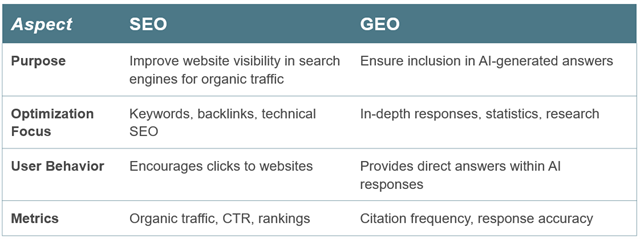As artificial intelligence continues to reshape the digital landscape, content creators and marketers face yet another new frontier: Generative Engine Optimization (GEO).
This emerging practice focuses on optimizing content to appear in AI-generated answers, ensuring visibility and relevance in a world increasingly dominated by generative AI platforms like ChatGPT, Google’s Search Generative Experience (SGE), and Perplexity AI.
In fact, the 2025 Consumer Adoption of AI Report found that 27% of consumers now use Gen AI for at least half of their internet searches. And among Gen Z and younger millennials, that rate increases.
So, it’s imperative that marketers and the organizations they work for start focusing on GEO … and quickly.
To help you get started, here we explore the fundamentals of GEO and how marketers can adapt their content strategies to thrive in this evolving ecosystem.
What Is Generative Engine Optimization (GEO)?
Generative Engine Optimization, or GEO, is the practice of tailoring content for AI-driven search engines that synthesize responses to user queries rather than merely listing links. It's sometimes also referred to as AEO, or Answer Engine Optimization.
Unlike traditional Search Engine Optimization (SEO), which focuses on rankings and click-through rates, GEO emphasizes creating content that generative AI engines can reference and incorporate into their responses.
To succeed in GEO, content must first perform well in traditional SEO rankings because generative AI often retrieves top-ranking results to synthesize answers. In essence, GEO builds upon SEO principles but extends them to meet the unique demands of AI-powered platforms.
SEO vs. GEO: Key Differences
While SEO and GEO share common goals – visibility and relevance – they differ significantly in execution:

What GEO and SEO have in common is an emphasis on high-quality, relevant content. Both strategies reward clear structure, credibility, and user-focused information.
How Do Generative AI Search Engines Work?
Generative AI search engines like ChatGPT or Google AI Overviews operate differently from traditional search engines:
- Content Retrieval: AI systems ingest web content through crawling or pre-training. For real-time queries, retrieval-augmented generation pulls relevant data from external sources.
- Knowledge Extraction: The AI identifies key facts and contextual relationships within the retrieved data.
- Answer Generation: Using large language models (LLMs), the system synthesizes a coherent response based on statistical patterns and retrieved information.
This process underscores why a strategic approach to GEO is essential – your content must be structured and authoritative enough to be selected as part of these synthesized answers.
Why GEO Is Important
Generative AI platforms are changing user behavior by delivering answers directly within the AI interface. This means users may no longer click through to individual websites but instead consume information from synthesized responses.
For brands, being cited in these answers builds authority and trust while driving indirect traffic and brand awareness.
Several key statistics highlight this shift:
- 63% of websites are already seeing traffic from AI-driven searches, according to a study by Ahrefs.
- Gartner predicts traditional organic search traffic will drop by 50% as users increasingly rely on AI-powered platforms.
Adding a focus on GEO ensures your brand remains visible in this new paradigm.
GEO Best Practices
To optimize for GEO, marketers must rethink their approach to content creation. Follow these best practices for optimizing your content for generative AI:
- Research User Questions: Anticipate what your audience might ask an AI engine. For example, a running shoe brand might focus on questions like “What are the best running shoes for injury prevention?” Structure your content around common user questions and use FAQs.
- Create Comprehensive, Quality Content: Follow Google’s E-E-A-T guidelines by prioritizing depth over breadth. Include expert quotes and statistics, and cite reliable sources to build trust.
- Leverage Keywords Naturally: Avoid keyword stuffing; focus on intent-based phrases.
- Optimize Page Structure: Use clear headings, bullet points, and FAQ sections to make your content easily digestible for both humans and AI systems.
- Keep Your Content Current: Generative AI favors up-to-date information; regularly refresh your pages with new insights or updates.
- Allow Crawling: Ensure bots like GPTBot can access your site by avoiding restrictions and submitting your site to Bing Webmaster Tools.
- Enhance About/Author Info: Build trust by showcasing expertise through detailed author bios.
Tools for GEO
Several tools can help marketers adapt their strategies for generative AI and understand how well your content performs in the GEO landscape:
- Semrush AI Toolkit: Search visibility tracking across AI platforms.
- HubSpot AI Search Grader: Audits your content for readiness across generative platforms.
- Writesonic Analytics: Tracks bot traffic and brand mentions in AI responses.
- Mangools AI SERP Tool: Evaluates visibility within AI-generated search results.
Examples of GEO Success
Research published on arXiv in June 2024 found that brands that used structured content formats, such as FAQs and clear headings, saw improved performance in generative AI platforms. And authoritative content with well-organized sections increased inclusion in AI-generated answers by up to 37% on platforms like Perplexity AI.
For one of our own clients, properly structured blog content, including the addition of FAQs and more in-depth copy, resulted in an increase in AI-driven sessions of 25% and a 300% increase in conversions from AI channels during a two-month time period.
GEO: The New SEO Frontier
GEO represents an exciting extension of traditional SEO tailored for the age of artificial intelligence. By optimizing early for GEO, marketers can gain a competitive edge while solidifying their brand as a trusted authority.
Ultimately, GEO isn’t just about adapting to technology – it’s about providing users with the best possible answers to their questions. For marketers, creating content that meets users’ needs isn’t at all a new idea. It’s simply an extension of the hard work you’re already doing into a new and evolving space.
Need help crafting a GEO and/or SEO strategy that gets results? Reach out! Our content and SEO strategy experts are ready to help you achieve your goals.





